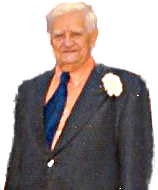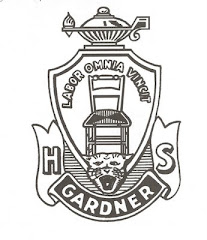Class of 1959
Gardner High School
Gardner, Massachusetts
Honoring Hervey Bowden
For so many GHS graduates, beloved history teacher Hervey Bowden was by far the best teacher ever at Gardner High. The following article by Mike Richard was published in the Gardner News during October, 2005.
This was the time of the year that Hervey Bowden always loved. It’s the night before the Gardner football team takes on Fitchburg, and at the old Gardner High School a raucous rally would be held in Pearson Auditorium in preparation for the Wildcats meeting with the Red Raiders. The culmination of the event came when Bowden, Gardner’s history teacher extraordinaire, would stride to the podium and offer an inspiring rally speech that would have rivaled the best performances of Knute Rockne or Vince Lombardi. Longtime Gardner High football coach Walt Dubzinski, Sr., whose teams always benefited from a little push before the big game, recalled that Bowden’s speeches would vary from year to year, but his tingling prose would usually end in similar fashion. “He would always conclude his speech with something to the effect of… ‘When the dust settles on Stone Field (or Crocker Field), and the sun settles to the west…’ and he would pause… ‘Gardner will leave Fitchburg a routed mass of humanity!’ and the place would just erupt with cheers,” Dubzinski recalled. If anyone knew how to have them riveted to their seats in the classroom, clamoring for more, it was the man who didn’t just teach history. Oh no, he made history. And he made it come alive for every student who walked into his classroom, with his unique teaching style. “It was just his big booming voice, his way of turning history into a story,” recalled recently retired Gardner High history teacher Dave Rahaim, who inherited Bowden’s room upon the legend’s retirement in 1970. “Of all the teachers I had, in both high school and college, no one had more influence in my style. I just loved the guy.” Bowden’s only son Henry recalled that his father “loved his history, and because of that I was brought up with a strong liking for history, myself.” “I’d have to say the man was blessed in that he got to do what he loved for his life’s work,” his son added. Gardner became the adopted hometown for Bowden, who was born in Monroe, Maine on June 13, 1900. After obtaining his undergraduate degree from the University of Maine at Orono, he attended Clark University to get his masters degree. It was while at Clark that he got wind of a job opening at Gardner High School, where he began his 43-year teaching career in the fall of 1927. “Hervey was a live wire as a teacher, and he wanted you to see what he was thinking,” remembered his former colleague Bob Hawke. “So if you were studying Napoleon riding up to Waterloo, that’s what he would do for you. You thought that you were on the battlefront, or in on the conference with the leaders. He made everything come alive for you.” It was the dramatic portrayal of historical events which left vivid memories in the minds of his students. He was particularly noted for his descriptions of Civil War episodes. “Everybody loved Hervey Bowden,” remembered Dorothy (Collins) Wirkkala, a member of the Class of 1935. “We hated it when the bell rang, everybody was sitting on the edge of their seats. He was fantastic.” Wirkkala recalled many a class where Bowden would get so immersed into his teachings, he seemed to vicariously leave the confines of his classroom to wind up somewhere near Gettysburg or Concord and Lexington. “He’d take that pole from the curtain rod and he’d fight some war. He’d get behind the desk and look at the class like he was scanning the battlefield,” she continued. “I don’t think there’s a soul who had Hervey that didn’t love the man to death.” Rahaim also recalled a humorous classroom war scene incident to which he was a witness. “He was talking about a particular battle in the Civil War and he was talking about how, at one point, soldiers were throwing their guns with the bayonets on them like they were spears,” Rahaim said. “Then he picked up his pointer and he threw it, and it went through the window. He broke the window. He got that much into it.” “He would pace back and forth from one side of the room to the other,” said Henry Bowden, who noted that he had his father as a history teacher his junior year, but only because the other college prep history teacher had retired the year before. “It wasn’t the practice back then for a teacher to have their children in class, but I’ll have to admit he had quite a presence in the classroom.” Bowden was noted for teaching world history, a course in Latin American history and history from other countries. However, it was his expertise in and love for U.S. history which really turned on several generations to the subject. In fact, Bowden realized that he would be limited in covering all of the important aspects of U.S. history from the revolution to present day, so he devised a workable alternative. He created the Recent History Club, which met one day a week after school and brought the students from the end of World War 1 to the present day. Yet while the seminar was labeled a club, you had best get yourself there for the one-hour session if you wanted to succeed in his class. “He would tell the students they didn’t have to go, but suggested that a number of questions on the next test would come from those lectures,” remembered Hawke. “It was his way of getting a big crowd for his presentation.” Eventually, the club would meet in Pearson Auditorium where it was always brimming with students anxious to benefit from his keen knowledge of history. “He was so theatrical, just a dynamic, mesmerizing speaker,” recalled Rahaim. “It was incredible, the number of people, who were not even his students, who actually showed up to the club, just to listen to him.” Aside from the impact he made on the teaching front as the longtime history department head, Bowden also had many other unique interests. For one, he was a voracious reader and keeper of voluminous illustrated notebooks on a variety of history related topics. In fact, Gardner High School has a room filled with more than 200 loose-leaf binders containing pasted in clippings from Life, Look, Time, Newsweek and Saturday Evening Post Magazines, as well as yellowed newspaper clippings. It is, without question, a one-of-a-kind historical anthology, lovingly compiled by an individual who used these unique teaching tools to spice up his lectures. Aside from his reputation as one of Gardner’s finest teachers, Bowden was always in huge demand as a public speaker by many organizations and fraternal groups. The lasting memory many have of him was delivering an impassioned speech before the Civil War marker at Gardner’s Monument Park at Memorial Day celebrations of yesteryear. In June of 1970, a few weeks following his 70th birthday, Bowden decided to announce his retirement from the classroom. As a retirement gift from his former students and members of the Foreign Policy Club, Hervey and his wife — the former Blanche Webb — were to go on an extended trip to Europe the following month. Bowden had never ventured from this country to explore foreign soil. Sadly, a few days before embarking on this adventure, Blanche was stricken ill with a heart attack while the two were at their summer home in Maine and died. “The students wanted them to go on a trip to see and experience the things he lectured about all those years in class,” said Henry. Despite the death of his wife, Bowden eventually made the trip to Europe with several good friends who accompanied him. His retirement years were spent occasionally teaching a course at Mount Wachusett Community College, or in his longtime involvement with the Hope Lodge Masons. He relocated to Lancaster to be closer to his son Henry and his wife Alice, where he lived until he was felled by a massive stroke around Thanksgiving time in 1988. Hervey Bowden died on Nov. 24, 1988 at the age of 88. At his funeral, several individuals offered eulogies for the man including former student Stig Miller. Miller recalled that, when he was shipped overseas during World War 2, he visited such places as Napoleon’s Tomb in Paris because he recalled the inspired lectures Bowden offered in the classroom. In his memory, and as a way to perpetuate his legacy as one of Gardner High School’s most illustrious educators, Hawke instituted the Hervey Bowden Memorial Scholarship given annually to a Gardner High graduate. “He was the greatest teacher Gardner High School ever had, but especially in history,” said Hawke. “No one could match him.” However, present day educators wonder if his lively approach to the subject and lecture-based lessons could work in this day. There is no question in Hawke’s mind. “Absolutely he could do it,” he said. “He could do it because he was so good.” (Comments and suggestions for The Gardner Scene can be sent to Mike Richard at Rich0725@ aol.com. or in writing c/o The Gardner News, 309 Central St. Gardner, MA 01440)




